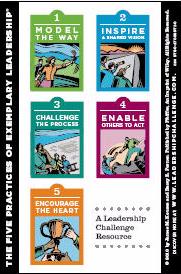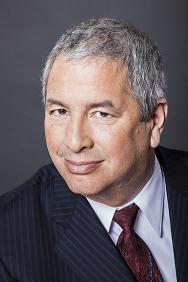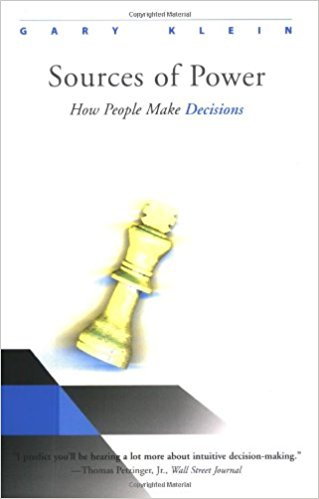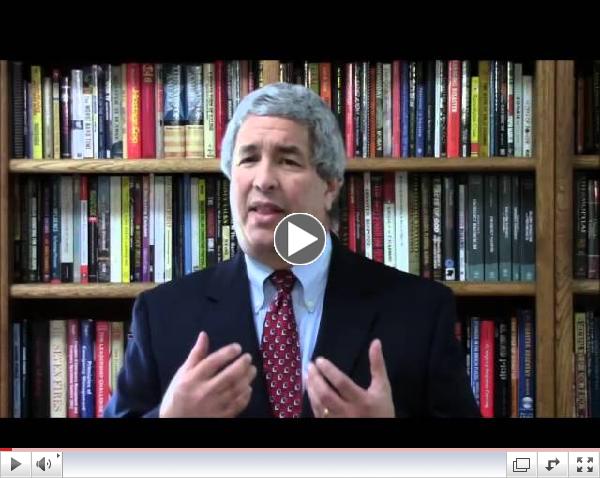With the continuing eruption of the Kilauea volcano, the issue of mega-tsunamis has begun to surface, particularly on social media. Like so many of the potential mega-disasters, the threat of a tsunami so large that it would devastate the Hawaiian Islands and the West Coast of the United States is possible though scientists consider it a low probability. This model shows the potential impact of a collapse of Kilauea and the subsequent tsunami it would generate. |
The following are excerpts from my blog
Canton on Emergency Management. Please visit my blog to see the rest of my articles.
Misinformation can cause unnecessary anxiety, particularly when you confuse possibility with probability.
|

What Is The Leadership Challenge?
 Is leadership a learned behavior or an innate personality trait? While there are certainly naturally charismatic individuals who are considered "born leaders", leadership is a measurable set of behaviors that can be learned and taught. This is the conclusion arrived at by researchers Jim Kouzes and Barry Posner after years of rigorous research. Starting in 1982, Kouzes and Posner set out to understand what happened when leaders performed at their personal best. They conducted hundreds of interviews and reviewed hundreds of cases studies and survey questionnaires. What emerged were five fundamental practices common to extraordinary leadership achievements:
- Model the Way
- Inspire a Shared Vision
- Challenge the Process
- Enable Others to Act
- Encourage the Heart
The Leadership Challenge begins with a 360-degree assessment of thirty leadership behaviors associated with the five practices, the Leadership Practices Inventory. The results are used to identify opportunities for improving as a leader by increasing the frequency of specific behaviors. Based on over thirty years of research, the Leadership Challenge is an effective and practical tool for leadership development.
To find out more about the
Five Practices of Exemplary Leadership
, consider taking
The Leadership Challenge
. Just click on the icon below for more information:
|
|
| Click here to take The Leadership Challenge |
____________________________________
The Leadership Challenge: How to Make Extraordinary Things Happen in Organizations
by James M. Kouzes & Barry Posner
_______________________________
The Leadership Challenge is a registered trademark of John Wiley &
Sons, Inc.
|
Free Resource Guide for Solo Consultants
For solo consultants, true wealth is discretionary time. Don't waste yours on simple tasks that can be handled by technology. This free resource guide reveals the four essential online tools I use to manage my solo consulting practice and save hours of valuable time. And the best part is - they're free!
 Interested in exploring the world of consulting? My membership site might be just the resource you need to get started. You'll have access to blogs designed to answer very specific questions, a resource library of templates and articles, the opportunity to network with peers, and discounts on coaching and training programs. Download the free guide or click on the logo above to go straight to the site.
Interested in exploring the world of consulting? My membership site might be just the resource you need to get started. You'll have access to blogs designed to answer very specific questions, a resource library of templates and articles, the opportunity to network with peers, and discounts on coaching and training programs. Download the free guide or click on the logo above to go straight to the site.
|

M
y Blogs
Follow Me
 |
|
Archive
|
|
|

Welcome to the May edition of Emergency Management Solutions.
One of the things that I think distinguishes emergency managers from others is our different concept of seasons. Others think of the four seasons: spring, summer, fall and winter. We, however, personalize the seasons based on risk. In California, we really only have two seasons: fire season and flood season. We're wrapping up the latter and bracing for the former.
Across the country, it's different. There's tornado season in the Midwest and hurricane season along the Atlantic seaboard. Winter has a different meaning in upstate New York than it does in San Francisco. Flood season is pretty common to most of the US, though.
Whatever, the season you're facing, stay safe!
Regards,
|
|
_
________________________________________________
Screening Community Proposals
Four Questions to Determine Value
|
|
|
"This is important! You should be doing this!" There are few public meetings I attended where someone didn't come up to me to tell me what my job should be. Sometimes they were suggestions; sometimes they were demands. Sometimes the suggestions were thoughtful; sometimes the demands were part of a personal agenda.
Not all the encounters were well-intentioned. I once had a politically-connected community leader threaten at a public meeting to "have my head on a platter." I pointed out that I served at the pleasure of my mayor and that he (the mayor) had the right to fire me but until he did, the answer to his ridiculous demand was still. "No."
Input from the public may not always be welcome, but it comes with the job and you do have a responsibility to at least give it some consideration.
_______________________
________
If you are having trouble viewing my featured article, try clicking on the link at the top of the page. You can always find my articles in the white paper section of my blog site,
Canton on Emergency Management.
|
|
Logic Versus Emotion
One of the key frustrations I had when I started out in emergency management was people who seemed immune to logic. It seemed that no matter how reasoned my arguments, I just wasn't getting through to them. Eventually I learned that reason seldom trumped emotion. In fact, some studies suggest that as much as 90% of our decisions are based on emotion.
This comes as no surprise to anyone who has worked in sales.
There is an axiom that says, "People buy on emotion and justify with logic." However, neuroscientists suggest that there's something a bit deeper going on than the word "emotion" would tend to suggest. What is taking place is a complex process in which the subconscious mind processes a considerable amount of information and affixes values on the options being considered based on previous emotions. The result is a decision based on what we would call intuition.
A similar process is described in Gary Klein's book, Sources of Power, based on his study of emergency responders. Klein terms the process the Recognition-Primed Decision Model. Klein suggests that decisions in a crisis are made through a subconscious comparison of the crisis to patterns learned in previous situations. Klein points out that these patterns can be acquired not only through direct experience but through study and simulations.
This suggests two things of interest to emergency managers. The first is that exercises are an effective way to increase your ability to make decisions in a crisis. The second is to trust your intuition in a crisis.
Professional Development Opportunities
Federal Emergency Management Agency
June 4-7, 2018
Emmitsburg, MD
This symposium will focus on the academic discipline of emergency management and developing instructional and research skills. Topics include the scholarship of teaching and learning, research methodology and integration, and program policy and administration.
July 8 - 11, 2018
Broomfield, CO
Since 1975, the Natural Hazards Center has hosted the Annual Natural Hazards Research and Applications Workshop in Colorado. Today, the Workshop is attended by over 500 federal, state, and local emergency officials; representatives of nonprofit and humanitarian organizations; hazards researchers; disaster consultants; and others dedicated to reducing risk and alleviating the harm from disasters.
Grand Rapids MI
The goal of the IAEM Annual Conference is to improve knowledge, competency level and collaborative skills. IAEM accomplishes this by attracting relevant high-profile
speakers to address current topics and practical solutions.
|
|
|
Sometimes the Old Dog Teaches the Trick
My father was the bookkeeper for a small manufacturing firm for most of his career. Upon retirement, he decided to look for a part time job to both supplement his income and keep himself busy. He soon found out that a major drawback wasn't so much his age as his lack of knowledge about computerized spreadsheet programs, particularly Lotus 1-2-3.
Dad could have been forgiven for passing on a new job or for lamenting that he was too old to learn computers. Instead, he called me up and asked what I knew about Lotus. I knew very little, but I did have the program on my computer as part of a suite of programs. That was enough for my father. He started spending a few hours each week at my home office teaching himself Lotus 1-2-3. He found that his knowledge of bookkeeping practices made it easy to grasp concepts and that learning Lotus was more a matter of learning commands and increasing his typing speed.
Dad worked at learning Lotus right up until his death a few months later from heart disease. On the day he died, we spent the morning in my office while he worked on the program; it was the last time we had together.
This time with my father taught me several things. The first is that you are never too old to learn; all it takes is the willingness to try. The second is that age is not a barrier to competitiveness; it is our belief that we are no longer competitive that holds us back. Finally, treasure the time you have together, even if it's just working together; it may be all the time you have.
|
Sources of Power: How People Make Decisions
By Gary Klein

Most managers are familiar with rational choice decision making models: define the problem, consider alternatives, select a course of action, implement. However, this model has proven ineffective in a crisis because of insufficient information and time constraints. In fact, many crisis managers don't appear to use a decision making model at all but instead rely on intuition.
Klein suggests that what we call intuition is really a complex subconscious process of pattern recognition. In a crisis, we subconsciously search our experiences for patterns that match the current crisis, run a quick simulation to determine if it is appropriate and then act, all in a matter of seconds.
The book can be heavy going at time but Klein illustrates key points with anecdotes from his research that are fascinating and hold the reader's interest.
|
|

Emergency Management: Concepts and Strategies for Effective Programs
by Lucien G. Canton

|
|
Need a speaker for your next conference? I offer keynotes, seminars and workshops.
 |
|
Three Reasons Why I'm the Right Speaker for Your Conference
|
|
|
Speaking Engagements
Emergencies and Evacuations: Creating an OSHA-Compliant Plan to Ensure Business Continuity and Employee Safety
June 26, 2018
10:30 AM PDT
It's the End of the World! What Do We Do Now?
Oct 24, 2018
Grand Rapids MI
|
|
| |
|